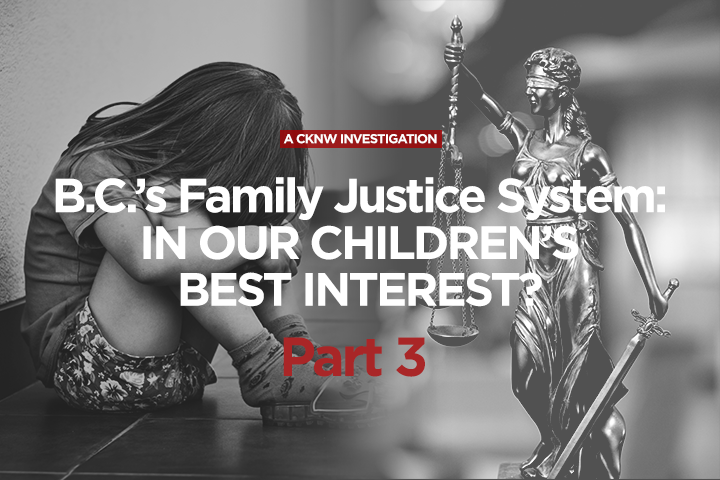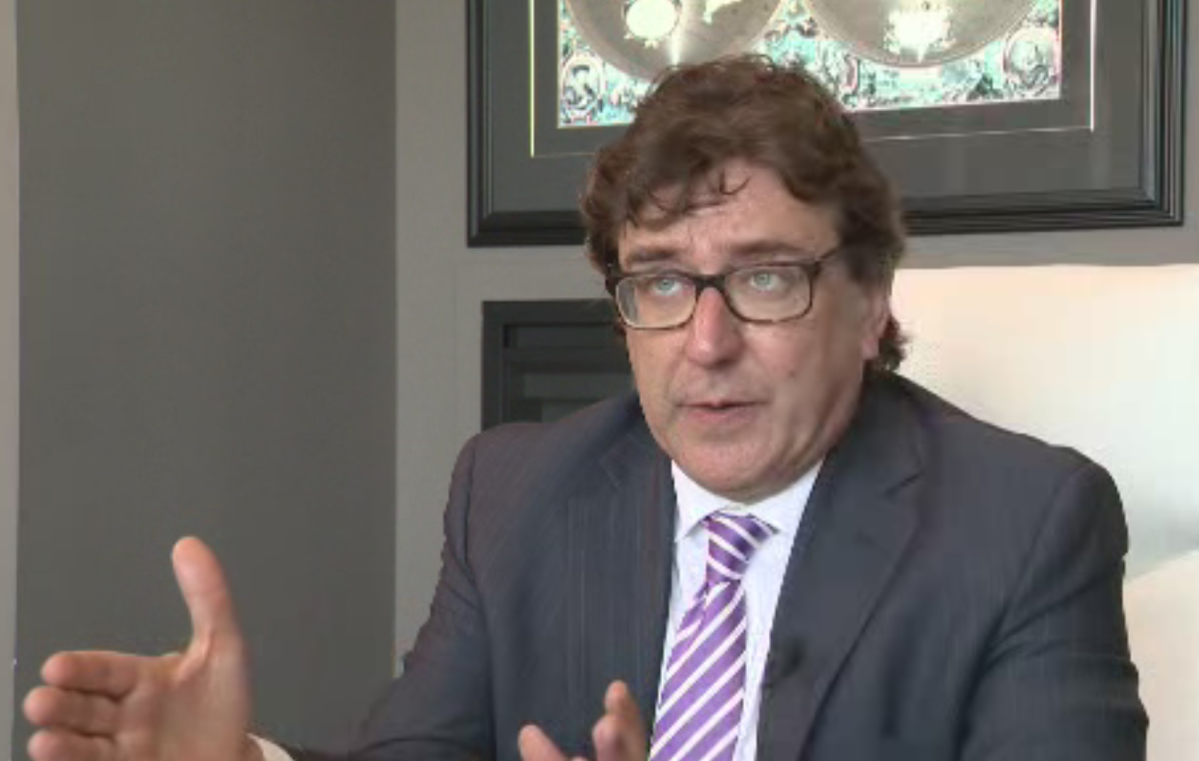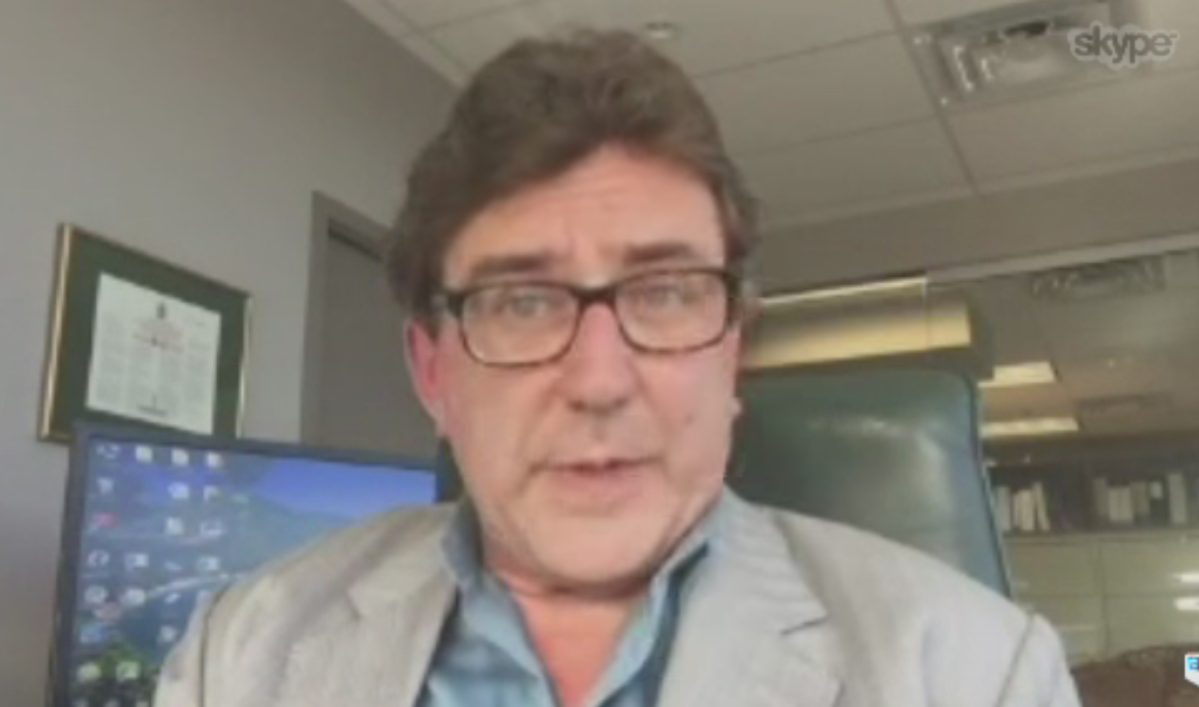It’s one of the most alarming family justice cases in Canadian history: A high-conflict custody battle with allegations of sexual abuse by a father and incompetence by B.C.’s Ministry of Children and Family Development (MCFD) that raises serious questions about how our system deals with families at their breaking point.

READ PART 1: How ‘flawed’ B.C. court rulings tore 4 kids away from their dad for 5 years and counting
READ PART 2: The B.C. judge who ‘ignored evidence,’ ‘erred in law’ and put a ministry under fire
In August, the B.C. Court of Appeal issued a shocking decision, overturning a pair of cases that found a father had sexually abused his kids and that the children’s ministry allowed it to happen.
At the core of the reversal was the appellate court’s finding that the case relied on evidence from a fraudulent expert supplied by J.P., the mother in the case (her name can’t be revealed due to a publication ban).

But what about J.P.’s lawyer? Did he have any issue with that expert before the judge accepted her evidence?
In the third part of a five-part series, we examine the role that J.P.’s lawyer played.
TIMELINE: The longest child welfare, civil litigation in the history of Canada
A lawyer’s role
From the time of the ancient Greeks up to now, the legal tradition has relied on the concept of an advocate to represent the accused.
The rules have changed with time but one idea has remained: a lawyer’s responsibility is to fight tooth and nail for their client.
But what responsibilities do lawyers have to the court system? And does winning at any cost serve children at the centre of family disputes?
J.P. was represented by well-known family lawyer Jack Hittrich, whose performance raised concerns at the Court of Appeal.
Justice Daphne Smith concluded that he should have acted with caution before presenting evidence from Claire Reeves, the key “expert” who the court later found to be unqualified.
“There were a number of obvious ‘red flags’ that ought to have alerted counsel for the mother,” Smith wrote.
Smith also wrote that she was “troubled” by Hittrich saying a witness – a psychologist who raised questions about J.P.’s parenting abilities – “lied and tried to perpetrate a fraud on the court.”
On a whole, Justice Smith’s decision raised questions about what Hittrich knew going into the trial.
“It seems like the Court of Appeal is criticizing the mother’s counsel,” said Erez Aloni, an assistant professor of law at UBC and an expert in complex family situations.
“He owes his loyalty to his client, the mother, but did he have any doubts about the credentials of the expert?”
One family lawyer who has followed the case closely believes the mother’s counsel bears much of the responsibility for the questionable witness.
“If counsel for the mother knew all of the details about this expert then it’s shocking that that expert would have been put forward and used in court,” said Georgialee Lang, a trial and appellate lawyer with more than 25 years of experience.
Lang said judges are limited in how much research they can do; once a trial is underway, a judge can’t go online and vet experts on their own.
That job is up to the lawyers, she said.

Get breaking National news
Concerns over evidence
Newly-discovered court documents reveal that at least one other lawyer was concerned about the evidence that J.P. wanted to present.
Jack Hittrich was her second lawyer; she fired her first one early on and filed a complaint against him to the Law Society of B.C.
In that disciplinary process, which eventually found no wrongdoing on that lawyer’s part, he raised questions about some of the evidence that J.P. wanted to use, including videotapes of the children disclosing the alleged abuse by their father.
But if J.P.’s first lawyer had a problem with the evidence, it raises questions about whether those issues also occurred to Hittrich — the answer is no.
Hittrich has applied to the Supreme Court of Canada to hear J.P.’s case.
In his application, Hittrich asked the high court to give more weight to disclosures made directly by children — including the videotapes.
He argued that the burden of proof should be lower for these cases in a bid to maximize the protection of children.
In a statement, Hittrich said the disclosures of abuse were not addressed by the B.C. Court of Appeal — and they’re central to this case, he argued.
He noted that the children’s disclosures to their nanny, family doctor and police were found to be credible by Justice Walker, even if they were dismissed by others.
The Supreme Court of Canada has yet to decide whether it will hear that appeal.
One case, lots of litigation
Litigation, in this case, has not been limited to the family trial and the ensuing civil suit against the province.
J.P. filed a defamation suit against her ex-husband’s (B.G.) mother and friend, claiming they reported her to social workers. (B.G.’s name is also under a publication ban).
That case went nowhere — and special costs were levelled against Hittrich for allowing his legal assistant to file misleading affidavits.
The judge in that case also found that Hittrich’s “failure to verify this information at an earlier date” amounted to a form of “serious misconduct that is most troubling to the court.”
J.P. also tried to sue the psychologist who questioned her parenting abilities. That case was tossed out as witnesses who testify are protected from being sued.
Additionally, J.P. tried – through the courts and the privacy commissioner – to block the province from having retired civil servant Bob Plecas review the MCFD file on the matter.
That failed too. And B.C. Supreme Court Chief Justice Christopher Hinkson criticized J.P. and her lawyer for trying to “forum shop” by attempting various avenues in a bid to win somewhere.
Balance between client’s wishes and court resources
Courts can hold people accountable for wrongdoing, but it comes with a cost. Each case takes up time and resources that are scarce in the justice system.
For that reason, the system has long held that a lawyer, as an officer of the court, has to balance between carrying out a client’s wishes and wasting the court’s resources.
“The attorney has both obligations,” said Erez Aloni.
“He has a legal, ethical obligation to be an officer of the court, and he has an obligation to be loyal to his client first and foremost.”
Jack Hittrich, the lawyer
Jack Hittrich has faced questions surrounding ethical obligations in the past.
In July, he was at the centre of another damning decision in B.C. Supreme Court – this time, the court expressed concern about what it called zealous advocacy.
It came in a legal battle started by B.C. foster parents who wanted to adopt a Metis toddler they had cared for since she was born.
The province had approved the little girl’s adoption by an Ontario couple who had already adopted her two older siblings.
Just like he did in J.P.’s case, Hittrich – on behalf of his clients, the foster parents – launched numerous lawsuits.
Justice Barbra Fisher took issue with those lawsuits saying they resulted in an “abuse of process,” and called Hittrich’s conduct “egregious.”
READ MORE: B.C. ministry failed to protect children sexually abused by father: judge
She found that Hittrich had tried to “blackmail” the director of adoptions after he claimed to have a recording of two social workers perjuring themselves.
In her decision, Justice Fisher said Hittrich’s threat was part of an attempt to secure what his clients wanted, and that it was “unrelated to the best interests of the child.”
Justice Fisher also blasted Hittrich for ignoring his responsibilities to the court.
She noted that Hittrich’s motivations may have reflected his clients’ wishes, but said “that cannot in itself absolve counsel from taking steps that conflicted with their overriding duties to the court and to the administration of justice.”
Justice Fisher also cautioned him against identifying too closely with his clients, “in order to provide effective, objective legal advice.”
In the end, Justice Fisher found that Hittrich acted zealously and overstepped his role as counsel, pushing the litigation process beyond what is acceptable.
He was ordered to pay 75 per cent of the costs related to one of the lawsuits.
Hittrich initially said he planned to appeal at the time that the decision was handed down. He filed documents in August, but he abandoned the effort in October.
In a statement, Hittrich said he’s bound by solicitor-client privilege, which prevents him from defending himself properly.
He said the decision not to appeal was a difficult one, but that he made it knowing that his former clients have ongoing matters before the courts.
Hittrich said he acted in what he believed to be his clients’ best interests at all times; he felt that waiving privilege could jeopardize any possible reunion with their foster daughter.
‘The best interests of the four children’
CKNW reached out to Hittrich for comment; he declined the offer of an interview despite having spoken about this case numerous times before. He said the matter is before the courts.
However, he did answer some questions in writing.
Hittrich said he believed the B.C. Court of Appeal was wrong.
READ MORE: Metis toddler removed from foster mom’s care
Hittrich said he had no reason to believe there were problems with Reeves’ C.V.; she had testified in court before, and had been cited in RCMP publications.
Hittrich also placed the responsibility for challenging Reeves’ credentials on the father, B.G.
He said B.G. had a chance to cross-examine Reeves about her qualifications. And even if B.G. didn’t have a lawyer, he still felt that the MCFD had advocated for him in the first 63 days of the family trial.
As for the judgment against him in the defamation case, Hittrich said it was the result of an inadvertent error.
‘We have a duty of zealous advocacy’
It’s easy for lawyers to become overly invested in the client’s perspective in family disputes, said John-Paul Boyd, executive director of the Canadian Research Institute for Law and the Family.
“Of course, many of us have children, and all of us have lost relationships of our own, so it’s easy to empathize with the client,” he said.
The current code of conduct also encourages lawyers to fight passionately for their clients.
“We have a duty of zealous advocacy, which requires us ethically and professionally, to pursue every relief to which our client could potentially be entitled, to ask every question no matter how distasteful,” Boyd said.
But “zealous advocacy” can sometimes interfere with the best interests of the children, and Boyd argued that a family lawyer is most valuable when they can provide their clients with an objective view.
WATCH: From 2015 – Province found liable in toddler sexual abuse case
Winning may provide short-term satisfaction, but it can also mean the conflict will drag on long after the court action is settled, added Boyd.
That’s a real concern, said Deanne Sowter, a law professor at the University of Calgary.
“These kids are going to be in both of their lives forever,” she said. “They need to be able to go to weddings together, they need to go to graduations together.”
To that end, lawyers need to watch the long-term implications of the fights they put up for their clients, Sowter argued.
New code of conduct
If you ask Boyd, there should be a new code of conduct that focuses on a healthy outcome.
“To prioritize the future functioning of the family as a goal worthy of pursuit, even though that may compromise what some would say it the optimal outcome for the client,” he said.
Such a code could have helped in J.P. and B.G.’s case, Boyd added.
CKNW asked Hittrich about the tension between “zealous advocacy” and the best interests of children.
In a written statement, he said the child’s best interest cannot be met unless one’s physical, psychological and emotional safety are protected “to the greatest extent possible.”
“Advocacy for the most vulnerable, when there is prima facie evidence of sexual abuse, should be the duty of any responsible counsel,” he said.
For Hittrich, that includes a willingness to take the case as far as he can — in this matter, that means going all the way to the Supreme Court of Canada.
Legal experts contacted by CKNW said the high court is unlikely to wade into this case.
But that isn’t stopping Hittrich. As he made clear, he considers it his duty to do all he can for his clients.
It’s one of the most alarming family justice cases in Canadian history: A high-conflict custody battle with allegations of sexual abuse by a father and incompetence by B.C.’s Ministry of Children and Family Development (MCFD) is raising questions about the family law system, and whether the current code of conduct for lawyers puts the best interest of children first.
In a five-part CKNW special investigation into the longest child protection-family dispute in Canadian history, reporter Charmaine de Silva explores whether a lawyer’s drive to secure a “win” for a client can ignore what’s best for kids stuck in the middle.
READ PART 4: The B.C. dad who couldn’t afford a lawyer, couldn’t get legal aid,and lost access to his kids















Comments